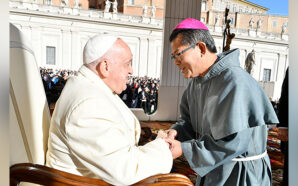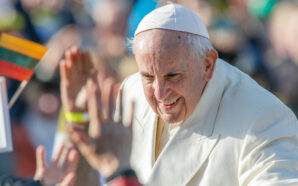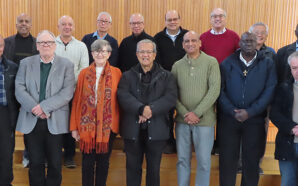Homily for the 19th Sunday in Ordinary Time, Year B
Readings: I Kings 19:4-8; Psalm 33(34):2-9; Ephesians 4:30 – 5:2; John 6:41-51
11 August 2024
For the third week in a row, we hear a gospel from John, Chapter 6 – Jesus’ discourse on the Eucharist, the bread of life. In today’s gospel, Jesus declares:
“I am the living bread which has come down from heaven;
anyone who eats this bread will live forever;
and the bread that I shall give
is my flesh, for the life of the world.”
LISTEN: https://soundcloud.com/frank-brennan-6/homily-11824
On Thursday we celebrated the feast of our one and only canonised Australian saint, Mary MacKillop. Not too many canonised saints have been excommunicated, being refused access to the Eucharist by their bishop, being denied the bread of life. But Mary MacKillop was. She and Fr Julian Tenison Woods had established their congregation, the Joeys, who were very modestly educated women attracted to a life of poverty, sent to remote parts of South Australia to teach poor Catholic children. They incurred the wrath of quite a number of the local clergy who were not much better educated, but who were jealous of their clerical position exercising authority in their parishes and controlling the finances. These priests saw the sisters and their superiors as a threat to their authority and to their parishes’ financial wellbeing. They convinced the local bishop Lawrence Bonaventure Sheil that their grievances were legitimate. Shiel who had approved the original rule for the sisters allowing them to work with a degree of independence and often in dire poverty, decided to change the rule for the sisters. He wanted to subject them more directly to his control throughout the diocese and he wanted sisters in local schools to be directly accountable to the parish priest. Mary stood up to him. Unsurprisingly, she found this male cleric to be a rather daunting presence. Whenever with him, she felt a touch overwhelmed. Sensing that things were coming to a head, she decided to spell things out unambiguously. She wrote to the bishop on 10 September 1871 saying:
“Will you kindly permit me to write a few thoughts which it troubles me to keep from you, and yet which I can hardly express when talking to you. I would speak them, my Lord, and I’m sure you would wish me to be unreserved with you, but I seem to lose courage lest in trying to be unreserved I would displease my Bishop. It is in a most docile and humble spirit my Lord that I now venture to say what are and have been for many years the thoughts of my heart.”[1]
She spoke of “all my desires seem(ing) to centre in a wish to devote myself to poor children and the afflicted poor in some very poor order”.[2] She went on to say, “Pardon me my Lord if I say that I cannot in conscience see the rule altered and remain still a sister. …I want to please you, but above all to please God, and do his Holy will. If then in any way it may please Him that you should alter the rule, then my Lord, I feel that I must take the alternative that you offered and leave the Institute until it may please God to give me in some other place what my soul desires.”[3]
This was all too much for the good Bishop. Within the fortnight, he excommunicated her, denying her the Eucharist, the bread of life. Her co-founder Fr Julian Tenison Woods was away in the eastern states. Four days after the excommunication, Mary wrote to him saying, “Don’t you see the protecting and beautiful hand of God in all that is happening? Oh never was I more tranquil and calm, and our loved Sisters the same. What matter if we have not our Habits for a time?…. We are all waiting, ready to go anywhere, under any circumstances, provided our rule is not taken from us, for in the Habit or out of it, with God’s help we will preserve its spirit until we are called together again.”[4]
A month after the excommunication, Mary sat down in more reflective mode and wrote what she called her ‘conscience letter’ to Tenison Woods saying: “I think I had better describe to you the exact way in which I felt from the time I heard that I was excommunicated. Though obliged to go to bed, it was about 3:00am before I could sleep. I thought of the awful nature of the sentence and all that I had ever felt when hearing of such things before came back to my mind. I thought of the state in which I was supposing I should die before morning, but with this thought came a calm resigning of myself into the arms of my good God whom I then most lovingly reminded that I was far from feeling rebellious towards my Bishop.”[5] She said, “In the end I went to sleep very happily with more loving confidence in my good God than I had felt for a long time.”[6] “I do not know how to describe the feeling but that I was intensely happy and felt nearer to God than I had ever felt before…I can only dimly remember the things that were said to me, but the sensation of the calm beautiful presence of God I shall never forget.”[7]
Mary was very grateful to the Austrian Jesuits at Norwood parish in Adelaide. They offered her sanctuary. They offered her the Eucharist. They offered her the bread of life. Mary wrote, “Nothing can exceed the kindness of the Jesuit Fathers. Indeed I fear that they may get themselves into trouble through this… They gave me something – may our sweet Mother tell you what, for I dare not write it. I am so afraid that should it ever be known they may get into terrible trouble. But they feared the weight of my cross on poor me and kindly wished to comfort me. I am rich in comfort, my Father, and really my wonder is that anyone should think my case hard. Do not be uneasy in any way. We are all in the loving hands of a good God.”[8] To think that the Jesuits could have been reprimanded by the local bishop for offering the bread of life to a living saint!
When Mary was canonised 140 years later, Australia’s most senior bishop George Pell described Bishop Sheil, as “a foolish and arrogant man, who let himself be misled by priestly lies”. At the Mass at St Paul’s Outside the Walls the day after the canonisation, Pell gave thanks to God “for the life, wisdom and contribution of St Mary of the Cross. We are grateful that she was not eccentric, not religiously exotic. We warm to her advice, are encouraged by her perseverance in sickness and adversity. Her faith and moral goodness are heroic, but not in a way which is off putting or surreal. She does not deter us from struggling to follow her.”[9]
Prime Minister Paul Keating was right when he told Parliament back in 1995 at the time of Mary’s beatification:
“[T]he beatification of Mother Mary MacKillop rings with significance for all Australians. The qualities she embodied—openness and tolerance, courage, persistence, faith and care for others—are qualities for individuals, communities and nations to live by. The Josephites continue to practice those virtues in their work for the poor in Australia and New Zealand, and increasingly in countries of the Third World.
“[W]e will serve Australia well, and future generations of Australians well, if we allow the values which inspired and guided Mary MacKillop’s work to inspire and guide our own. There is nothing to be gained from pretending that religious faith and the place of the church in our communities have not declined since Mary MacKillop’s day, yet the message of her life easily translates to our much more sceptical and secular society. It would, I think, bring a blessing on Australia, on future generations, if as a result of the beatification of Mary MacKillop that message spread.”[10]
At the time of Mary’s canonisation in 2010, Tony Abbott told parliament: “In an era when the church and its representatives are often thought to have failed people, her canonisation is a timely reminder of the good that has been done in this country and elsewhere under the influence of Christian faith”.[11]
No matter what the shortcomings and deficiencies of our Church, let’s continue to offer the bread of life to those who humbly seek it. Whenever we feel wronged or slighted, let’s recall the witness of Mary MacKillop who would not hear a bad word against her second rate bishop. Like Mary and her wronged sisters all those years ago, let’s espouse those words of Paul to the Ephesians: “Never have grudges against others, or lose your temper, or raise your voice to anybody, or call each other names, or allow any sort of spitefulness. Be friends with one another, and kind, forgiving each other as readily as God forgave you in Christ.”zq Let’s share together the bread of life.
From the start of 2024, Fr Frank Brennan SJ will serve as part of a Jesuit team of priests working within a new configuration of the Toowong, St Lucia and Indooroopilly parishes in the Archdiocese of Brisbane. Frank Brennan SJ is a former CEO of Catholic Social Services Australia (CSSA). Fr Frank’s latest book is An Indigenous Voice to Parliament: Considering a Constitutional Bridge, Garratt Publishing, 2023 and his forthcoming book is ‘Lessons from Our Failure to Build a Constitutional Bridge in the 2023 Referendum’ (Connor Court, 2024).
[1] Letter of Mary MacKillop to Bishop Shiel, 10 September 1871, in Sheila McCreanor (ed.), Mary MacKillop and a Nest of Crosses, Sisters of St Joseph of the Sacred Heart, 2011, p.257.
[2] Ibid, 258.
[3] Ibid, 259.
[4] Letter of Mary MacKillop to Fr Julian Tenison Woods, 26 September 1871, op. cit., pp.274-5.
[5] Letter of Mary MacKillop to Fr Julian Tenison Woods, 16 November 1871, op. cit., p. 310.
[6] Ibid.
[7] Ibid, p. 311.
[8] Letter of Mary MacKillop to Fr Julian Tenison Woods, 11 October 1871, op. cit., pp. 284-5.
[9] See https://www.catholicculture.org/culture/library/view.cfm?id=9443.
[10] Hansard, House of Representatives, 2 February 1995, p. 358.
[11] Hansard, House of Representatives, 18 October 2010, p. 438








